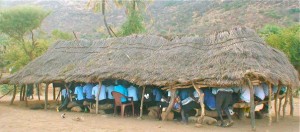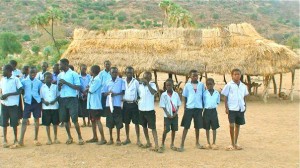The following is an article by musician and Sudan activist Slater Armstrong, who has spent a lot of time in the Nuba Mountains, recording the worship music of the church there, just as he did in South Sudan for his CD, Even in Sorrow. Armstrong is now the co-founder of ENGAGE (End Nuba Genocide: A Global Effort).
Armstrong reveals the history of this ancient people of Kush. “The current political situation must be viewed with the backdrop of this historical context to fully appreciate the threat of complete annihilation of the Nuba at hand. The United Nations is in the compromised position of catering to the designs of it’s powerful Arab bloc, as well as the most powerful business partners of Sudan on the Security Council, China and Russia,” says Armstrong.
The Last Of The Nuba – Slater Armstrong
Sunday, June 12, 2011
“The last of the ancient Nuba people died in the genocide today!” is a potential headline if something drastic and decisive is not done soon to prevent the genocidal regime of Khartoum, Sudan from their stated goal to eradicate the noble, “pure people” of the Nuba Mountains of Sudan.
Across the continent of Africa, in the distant new lands of America, we are literally a world away, and have no context to process the tragedy unfolding in this most remote, most devastated place. Without this context, they are just another tragedy in the land of Africa where “those people” are killing each other again. In a world on fire with natural calamities too numerous to list, and the “Arab Spring” moving into an “Arab Summer,” how can we hear another story of someone else’s pain that has no connection to our
own? But is there a connection?
Please grant these most desperate children of the ancient Nubian Kingdoms of Kush a moment of your time to hear the swan song of their final cry. The people of Kush, modern day Sudan, have a story as deep and as long as the great Nile River that runs through it, as immovable as the Nuba Mountains that bear their names. This article cannot begin to express the myriad of stories their history tells. Here are a few brief highlights:
They were host to some of the world’s earliest recorded civilizations. They were the Black Pharaohs of Egypt, who fought alongside Israel to prevent their annihilation by Assyria. The biblical story of Phillip and the “Ethiopian eunuch” records the Christian baptism of the Jewish official from the court of the Queen of the South, the Candace (pronounced “kan-da-ke”), ruler of the lands of Kush in the 8th century of the dynasty of Meroe. They were Christian Kingdoms from the 6th century AD until the 15th century AD when they
were finally subjugated by the Arab-Islamic slave trade.
At the end of the 19th century, in an attempt to abolish the slave trade in Sudan, the British defeated the Mahdi (Islamic “messiah”), and established a British-Egyptian condominium rule that lasted from roughly 1898 until 1956. When Sudan was granted their independence, the “keys to the kingdom” of Sudan (Arabic for “land of the black slave”) were handed to the elite Arab merchants (“Jellaba”), and they have been in “civil war” ever since.

Here is a typical Nuba Mountains "school," while children in Northern Sudan have modern, Western-building schools. (Photo by Slater Armstrong)
The problem with the term “civil war” is the equivocation between the two parties in conflict, that diminishes the rightful cause of the one party to defend themselves as a people from the genocidal ambitions of the other. For centuries the genocide took the form of forced Arabization and Islamization as tools of subjugation. Through rape and sex
slavery an army of “black Arab” tribes was cultivated to do the dirty work of “harvesting” the valuable commodity of chattel slaves in the Sudan. It is these very same Arabized tribes that have been employed by the Islamist regimes of Sudan, trained by the very first Al Qaeda training camps (“janjaweed” and “mujahadeen”), who have been unleashed to finish the job of complete eradication, “solving the Nuba problem” finally!
The current political situation must be viewed with the backdrop of this historical context to fully appreciate the threat of complete annihilation of the Nuba at hand. The United Nations is in the compromised position of catering to the designs of it’s powerful Arab bloc, as well as the most powerful business partners of Sudan on the Security Council, China and Russia. Of course the power brokers in all of this are those extracting the most
valuable world commodity of oil, clawing at the purse strings and defining conversation on this crisis. The talk is all about the “oil rich district of Abyei” being contested by the North and the new South Sudan. Until recently, when the state of South Kordofan is mentioned it is merely in terms that cast the beleaguered SPLA of the Nuba as a side story with little relevance to the bigger picture, sore losers who can’t seem to just move on.
What is being under reported and seemingly left out of the equation by the international community is the fact that the Omer Bashir-Ahmed Haroun genocide team has clearly stated, for all the world to hear, the releasing of their hordes of hell with a “free hand” to “remove the rebels who remain” and chase them all the way into the caves and mountains where the civilians seek refuge. This is the resumption of the program implemented prior
to the CPA as stated in Roger Winter’s monumental report on landmines in the Nuba, “Landmines and recovery in Sudan’s Nuba Mountains” (Africa Today Vol. 55,
No. 3 (2009) – “Under the Islamist regime of Brigadier Omar Hassan Al-Bashir (30
June 1989 to present), some officials in the national government of Sudan went further and repeatedly expressed overt intentions at exterminating the Nuba people and in the process resorted to all means, including the use of Baggara militias, to achieve a “final solution” to the “Nuba problem” (Africa Watch 1992; Rahhal 2001).


